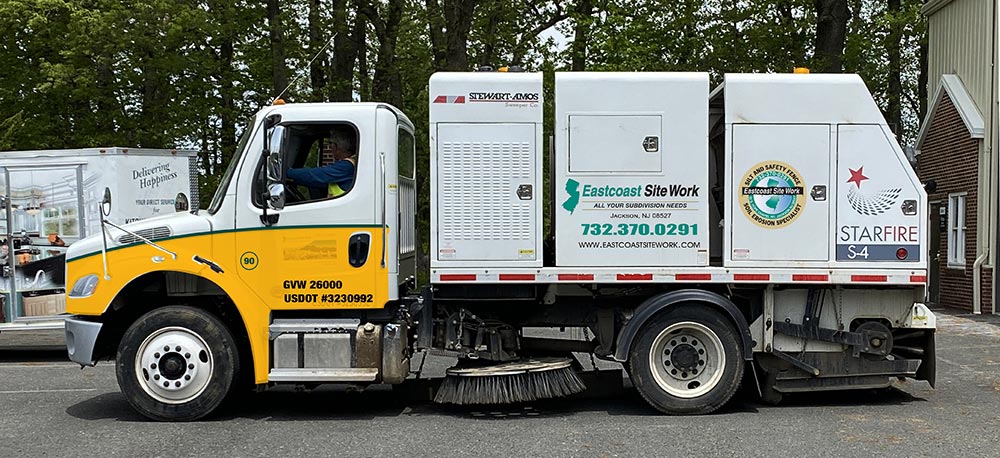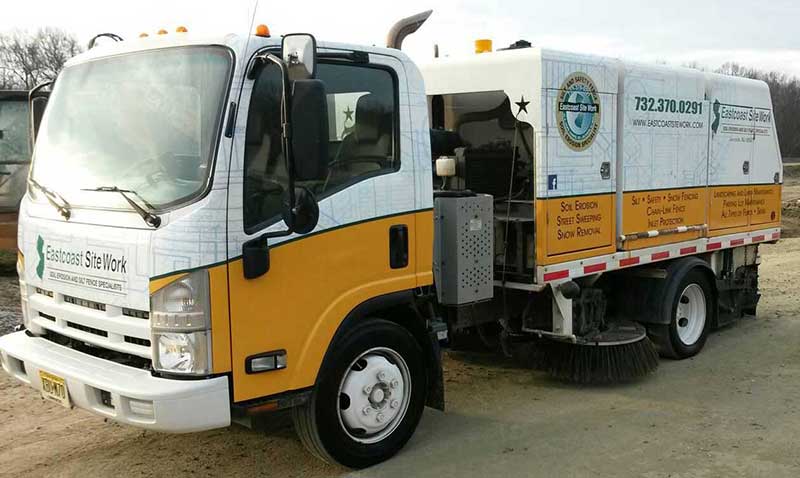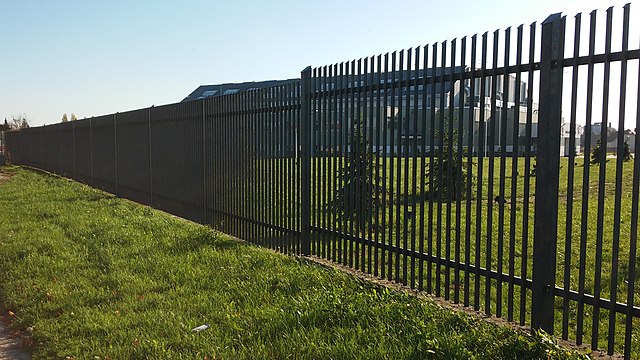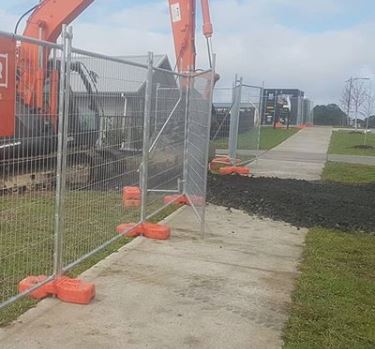Street Sweeping Services for Spotless Construction Sites in New Jersey
Are you tired of debris slowing down your construction progress? Did you know that street sweeping services can significantly enhance safety and efficiency on construction sites? According to many legal websites, a poorly maintained worksite allows clutter and debris to build up, creating slip, trip, and fall hazards. Let Eastcoast Site Work keep your construction site clean and safe with our expert street sweeping services.
Incorporating a street sweeper into your construction site management plan is a proactive measure that not only ensures compliance with regulations but also contributes to a safer, more efficient, and environmentally friendly construction process.
Get A Street Sweeping Quote
Maintaining cleanliness in construction sites is extremely important for safety and efficiency during work. Something that makes keeping the site clean much easier is the street sweeper. Eastcoast Site Work provides street cleaning services throughout New Jersey, leveraging over two decades of work in the construction industry to shed light on the importance of street sweeping services.

Debris, nails, and dust are all unavoidable things. They will pop up in construction sites and parking lots too. These scraps can lead to hazardous working conditions and could potentially slow down the progress of work. Street sweepers designed for efficient and thorough cleaning, are a game-changer for construction sweeping.
Here are the benefits of using a street sweeper on your New Jersey construction site. Whether you’re a construction professional, part of a property management team, or a commercial property owner, understanding these benefits can greatly enhance your site’s safety, efficiency, and overall image. So let’s see how hiring a street sweeper can positively impact your project.
Understanding the Importance of Clean Construction Sites
Maintaining cleanliness at a construction site is about more than just keeping the area looking nice. It’s a crucial aspect of best management practices that can significantly impact the overall success of your project. A well-kept and organized site is not only safer for workers but also improves productivity and leaves a positive impression on property management, HOA organizations, and owners of large commercial properties.
Clean Construction Sites Matter
Maintaining cleanliness at a construction site ensures safety, enhances productivity, and contributes to community pride. Construction professionals must uphold high standards of cleanliness and organization at their sites to benefiting everyone involved.
The US Department of Transportation Federal Highway Administration has included Street Sweepers as an environmental topic on their website. In the article, Stormwater Best Management Practices in an Ultra Urban Setting: Selection and Monitoring, they state that in ultra-urban settings where there is limited acreage available for the installation of structural controls, street sweeping is a good fit.
Commercial business centers, industrial sites, and highly developed places near receiving waters should all take it into consideration. Street sweeping may be taken into consideration for highway applications in locations such as maintenance yards, rest stop parking lots, road shoulders, and places where safety permits.
The most effective way to reap the benefits of street sweeping is to use the most advanced sweepers, perhaps once a week or every two months, depending on the conditions in your area. You should also carefully consider whether you can enforce any laws, like limiting street parking before and during sweeping. Oil and grease cannot be effectively removed by sweeping the street, and the capacity of older, traditional motorized sweepers to remove fine silt is restricted.

Cost-effectiveness of Street Sweepers:
Street sweeping services offer significant cost savings for construction companies, property managers, and urban areas by efficiently removing debris and maintaining cleanliness. Here’s how:
Reduced Maintenance Costs for Equipment and Infrastructure: Street sweepers help prevent debris buildup on roads, parking areas, and construction sites, reducing wear and tear on vehicles, machinery, and infrastructure. According to a report by the American Public Works Association (APWA), regular maintenance can extend the lifespan of roads and pavements by up to 25%. This translates to substantial savings in maintenance and repair costs over time.
Street sweeping has proven to be one of the most cost-effective measures for protecting waterways from street runoff pollution. The city of Seattle’s street sweeping program’s data indicates that the cost per pound of pollutant removed through street sweeping is approximately $4.80, significantly lower than the cost of conventional end-of-pipe solutions, which can range from $8.20 to $53 per pound. Moreover, street sweeping offers additional benefits by removing larger debris, such as leaves, which contribute to nutrient runoff and algal blooms. By investing in street sweeping, Seattle has demonstrated a cost-effective approach to stormwater pollution prevention.
Decreased Liability Risks: Clean and well-maintained surfaces contribute to safer environments for pedestrians, motorists, and workers. Street sweepers help remove hazardous debris, such as broken glass, nails, and other sharp objects, reducing the risk of accidents and injuries.According to the National Highway Traffic Safety Administration (NHTSA), debris-related crashes result in an estimated 25,000 injuries and nearly 90 fatalities each year in the United States. By proactively removing debris from roads and parking lots, street sweepers help mitigate these risks and potential liability costs for property owners and municipalities.
Savings on Fines and Penalties: Many municipalities and regulatory agencies have cleanliness regulations in place to maintain public health and safety standards. Failure to comply with these regulations can result in fines and penalties for property owners and construction companies.By investing in the use of a street sweeper service, companies can avoid potential fines and penalties associated with non-compliance. For example, in California, where stormwater pollution regulations are strict, fines for violations can range from $500 to $10,000 per day per violation. Regular street sweeping helps prevent stormwater pollution by removing debris and pollutants from streets and parking areas, ensuring compliance with regulations and avoiding costly penalties. Overall, the upfront investment in street sweeping services can yield substantial long-term cost savings by reducing maintenance expenses, mitigating liability risks, and avoiding fines for non-compliance with cleanliness regulations.
Regulatory Compliance and Street Sweeping:
Regulatory requirements and standards govern cleanliness and maintenance in construction sites and urban areas. New Jersey street cleaning services are essential for ensuring compliance with these regulations and standards, as they help companies and property managers meet and exceed cleanliness requirements. Here’s how street sweeping contributes to regulatory compliance:
- Stormwater Pollution Prevention: One of the primary regulatory concerns in construction and urban areas is stormwater pollution prevention. Debris, sediment, and pollutants accumulated on streets, parking areas, and construction sites can be washed into storm drains during rain events, contaminating water bodies and posing risks to aquatic ecosystems and public health. The U.S. Environmental Protection Agency (EPA) mandates the implementation of Best Management Practices (BMPs) to prevent stormwater pollution, including regular street sweeping. Street sweepers effectively remove debris and pollutants from surfaces, preventing them from entering stormwater runoff and ensuring compliance with EPA regulations.
- Clean Water Act Compliance: The Clean Water Act (CWA) requires municipalities and property owners to implement measures to protect water quality and prevent pollution. Street sweeping is recognized as an effective measure for meeting the requirements of the CWA, as it helps reduce the discharge of pollutants, such as sediment, heavy metals, and organic contaminants, into water bodies. By investing in street sweeping services, New Jersey companies and property managers demonstrate their commitment to environmental stewardship and compliance with federal regulations, avoiding potential fines and penalties for non-compliance.
- Local Ordinances and Municipal Codes: Many municipalities and local governments have ordinances and municipal codes that mandate cleanliness and maintenance standards for streets, parking lots, and construction sites. These regulations typically require regular street sweeping to control dust, remove debris, and maintain aesthetic appeal. By partnering with street sweeping service providers, companies and property managers can ensure compliance with local ordinances and municipal codes, avoiding citations and penalties for violations.
Street sweeper services are instrumental in helping companies and property managers achieve regulatory compliance, mitigate environmental risks, and uphold cleanliness standards in construction sites and urban areas. By investing in street sweeping, businesses demonstrate their commitment to environmental responsibility and public health while avoiding potential legal and financial consequences of non-compliance.
Enhancing Property Values
But the benefits of using a street sweeper extend far beyond cleanliness. Maintaining a clean and tidy area can significantly enhance property values. Consider two neighborhoods – one with clean, debris-free streets, and another with streets littered with trash and debris. It’s easy to see which one would command higher property values.
The Impact of Sweeping Services on Construction Sites and Beyond
The advantages of engaging a professional sweeping company for parking lot sweeping, street cleaning, and maintaining clean construction sites cannot be overstated. It contributes to the overall safety and efficiency of construction projects, but it also plays a pivotal role in enhancing property values and fostering community pride. Eastcoast Site Work provides comprehensive cleaning solutions that go beyond mere aesthetics.
By ensuring construction sites and surrounding areas are free of debris and hazards, we can maintain a cleaner, safer, and more appealing environment for everyone. The role of parking lot sweeping and street cleaning extends beyond the confines of construction sites, reinforcing the need for and value of professional sweeping services in building and maintaining quality urban spaces.



